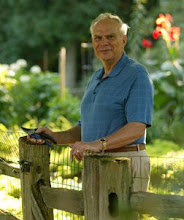Part Two ends with Okonkwo, his seven year exile completed, giving a great feast of gratitude for the people of Mbanta. An elder responds with a speech of gratitude to Okonkwo, and in it he expresses fear that their culture is giving way to that of "an abominable religion. Part Three shows how that is happening.
Back in Umuofia, Okonkwo determines to regain his former position of prestige and power as the strong man of the village. His hope resides in his five sons and his daughters, wanting them all to marry well. But, alas, all is not well in the village. Not only the outcast and lowly-born of the tribe have become Christian, but also some "worthy men," such as Obguefi Ugonna. Further, the white man is imposing his laws, and many of the men of the tribe have been thrown into his prison. Okonkwo is determined to fight the white man, but his friend Obierika tells him is too late for that. Too many of their own tribe have joined the white man's religion and government.
Why is it so? The people see the benefit of the mission schools, appreciate the medical clinic and how effective the white man's medicines are, and the village is receiving economic benefits from the new trading store. Not only so, but the missionary, Mr. Brown, has ingratiated himself to the tribe by showing respect for their traditional views, taking care not to provoke their wrath, and avoiding an over-zealousness on the part of his converts, while all the while presenting the Christian message.
But, alas, Mr. Brown's health breaks, and he is replaced by Mr. Smith, whose approach is quite different. He represents a certain mentality which characterizes all too many conservative Christians. He indeed knows the Scripture, and can quote it readily, but he applies its precepts without a sense of compassion and an effort to understand the thinking of those upon whom he would lead to Christianity. His approach is one of heavy-handed coercion with no respect for those to whom he would minister.
Smith's manner encourages the over-zealous members of his native congregation, vicious confrontation ensues, and the Christian church is burned down. Achebe is clearly showing that arrogance, ignorance, and prejudice have no place in missionary activity.
Okonkwo bitterly opposes the new religion and would summon the village to arms in an effort to rid it entirely of the white man and his ways. His anger is intensified when the District Commissioner, to whom Mr. Smith has appealed for justice when his church was destroyed, summons the strong men of the village to his court with the guise of friendly discussion, but then turns upon them, handcuffs and imprisons them, imposing a heavy fine.
Released, Okonkwo kills a messenger from the white man's government, but instead of igniting a village uprising, his fellow villagers look at him with dismay. "He knew that Umuofia would not go to war. He knew because they had let the other messengers escape. They had broken into tumult instead of action. He discerned fright in that tumult. He heard voices asking: 'Why did he do it?'" (205).
The question must be asked, Is Okonkwo heroic? In what sense? He is not noble; he is not especially intelligent. He indeed has strength and stubbornness, but these alone are hardly make a warrior heroic. He is more pathetic than tragic.
The irony compounds with his suicide and ignominious burial by strangers. He intended to defend the tribal tradition and the tradition itself betrays him, for committing suicide is taboo. No Igbo may even touch his body. The tribe will make sacrifices to cleanse the land from the desecration he has wrought.
The final irony is struck by the District Commissioner's response given in the final paragraph. He sees Okonkwo as a curiosity, to whom he will devote perhaps a paragraph in the book he is planning, one that will present the "pacification of the primitive tribes" in an effort to give an authoritative depiction to his Western readers back home. Achebe's ending pronounces a cutting disdain for a purely intellectual approach to colonization and missionary activity, one that assumes an understanding it does not begin to have, one that lacks human sympathy and fellow feeling, one that refuses to recognize the dignity and extend respect to a culture other than one's own.
